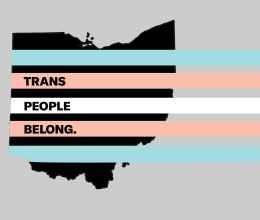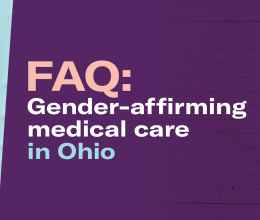A majority of Ohio House Republicans kicked off Pride Month by amending anti-trans language into an unrelated bill, just before midnight on June 1. Lawmakers used the final session before their summer recess to amend HB 151, an education-related bill, by adding a ban on transgender girls and women playing on sports teams that match their gender identity.
These provisions come from HB 61, sponsored by Representatives Jena Powell and Reggie Stoltzfus, which received two hearings last year in the House Primary, Secondary, and Education Committee.
This is the second time the House has tried to circumvent the committee process by amending HB 61 into a separate, unrelated bill. Last summer, the House amended it into Senate Bill (SB) 187, a bill dealing with compensation for college athletes. The House then passed SB 187, but the Senate has since declined to take further action. It instead passed a separate bill allowing compensation for college athletes.
At last week’s House Session (which started on May 31 and went into the next day), the vote occurred in the middle of the night when most Ohioans did not even know the House was still meeting. This is an intentional, tried-and-true tactic to avoid public scrutiny.
Pride Month is supposed to be a time of joyful celebration for the LGBTQ+ community. Instead, the legislature chose to score cheap political points at the expense of trans youth.
At this point, HB 151 requires Senate consideration before it could advance to Gov. Mike DeWine’s desk. Senate President Matt Huffman has recently suggested he would prefer the Senate Workforce and Higher Education Committee to conduct hearings on Sen. Kristina Roegner’s SB 132, which is identical to the anti-trans provisions amended into HB 151.
Unfortunately, that means some version of this legislation will have real momentum when the Ohio General Assembly reconvenes in November.
HB 151’s ban on trans girls and women playing on women’s teams applies to both high school and college athletes. The bill would allow anyone to dispute an individual’s sex, which would trigger a process that requires the individual to establish their sex by presenting a doctor’s statement “based only upon the following:”
- Their “internal and external reproductive anatomy;”
- Their “normal endogenously produced levels of testosterone;”
- “An analysis of the participant’s genetic makeup.”
The bill does not specify how or when someone can dispute an individual’s sex. Could a parent single out a player on the opposing team for looking too “masculine” or being bigger than other players? Could this happen immediately before or during a game? We can only speculate, because the language is not clear. This is one of the many problematic aspects of this provision.
Further, it is unclear whether the individual in question must meet all three of the above conditions or just one.
The first option would require women and girls to undergo invasive genital examinations. Melissa Wervey Arnold, CEO of the Ohio Chapter of the American Academy of Pediatrics, told Anna Staver of the Columbus Dispatch that these are not standard pediatric practices, and that several doctors might refuse to perform such an exam on a minor.
To be clear, any of the above constitutes a total invasion of privacy.
Whether insurance would even cover these tests is another issue entirely, potentially leaving individuals and their families to foot the bill.
So, not only does the legislation require children to undergo potentially traumatizing and invasive inspections, but they may also be financially responsible—all so that they can play sports.
The bill allows anyone to sue school districts or an athletic organization if they were “deprived of an athletic opportunity,” or if they suffered “any direct or indirect harm” resulting from a violation of the bill. What defines “being deprived of such an opportunity” or “suffering harm” under the bill is anyone’s guess. This vague wording could open the door to scores of lawsuits.
The bottom line, though, is that this legislation seeks to single out trans girls and women as not belonging on girls’ and women’s teams. Were this bill to pass, young people like Ember, a high school junior who loves to play softball, would have that opportunity ripped away from them.
We all remember how hard it could be to fit in and find a community growing up. We all sought acceptance from our peers. For many of us, playing sports (or some other extracurricular activity) served as a source of joy. The basketball court or the soccer field provided a way to make friends, express yourself, and pursue athletic success.
This legislation does not “level the playing field” for girls and women in sports, as its proponents claim; rather, it represents state-sanctioned bullying against an already marginalized population. Data shows that LGBTQ+ youth, and particularly trans youth, are at much higher risk for seriously considering suicide than other youth.
Gov. DeWine was absolutely right in his statement from last year opposing this legislation when he said “this issue is best addressed outside of government.” We completely agree; trans bodies do not need governmental regulations. The Ohio High School Athletic Association (OHSAA) and the National Collegiate Athletic Association (NCAA) already have policies in place that trans athletes follow in order to play.
HB 151 is a solution in search of a problem and yet another step in the wrong direction. To make matters worse, the House passed it the same week that HB 454, a ban on gender-affirming care for trans youth, received its fourth committee hearing.
The same pattern is playing out nationally, with hundreds of anti-LGBTQ+ bills before state legislatures. Ohio is very much at the forefront of this movement. The collective toll these bills have on trans youth is undeniable—a recent poll from The Trevor Project found that 85 percent of trans and nonbinary youth say recent debates around their rights have worsened their mental health.
Instead of attacking trans youth, our elected officials must take steps to protect them. The legislature should instead focus its efforts on passing the bipartisan Ohio Fairness Act, which would establish anti-discrimination protections for LGBTQ+ Ohioans.
The ACLU of Ohio will continue to fight alongside the Ohio Business Competes coalition—a nonpartisan coalition of businesses committed to nondiscrimination policies—to fight for trans youth and all LGBTQ+ Ohioans.
This Pride Month and beyond, we will continue to mobilize for policies that support LGBTQ+ youth and the entire community. Join us at a Pride event near you.
Take action against this hateful ban, against HB 454, and for the Ohio Fairness Act today .







